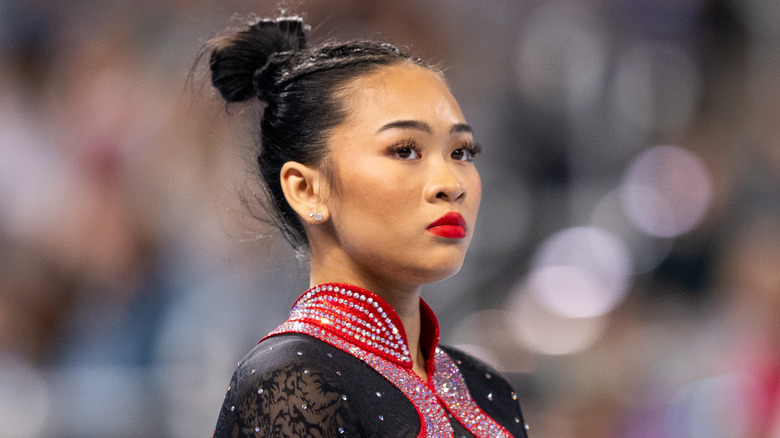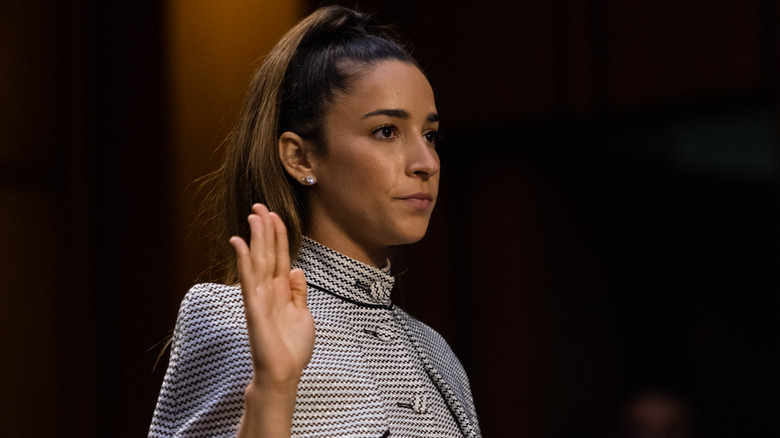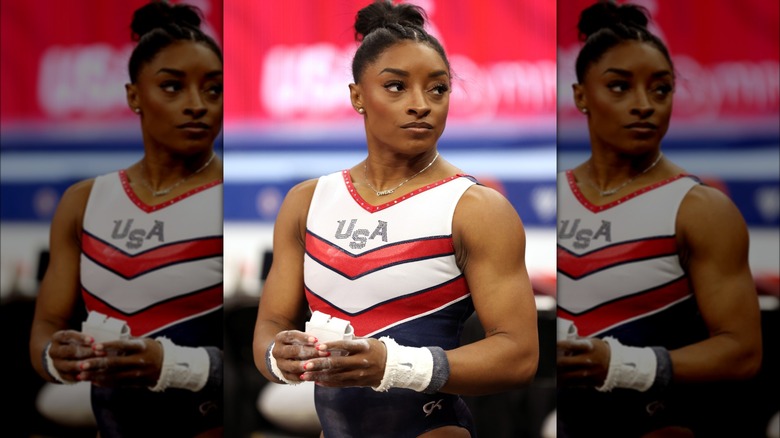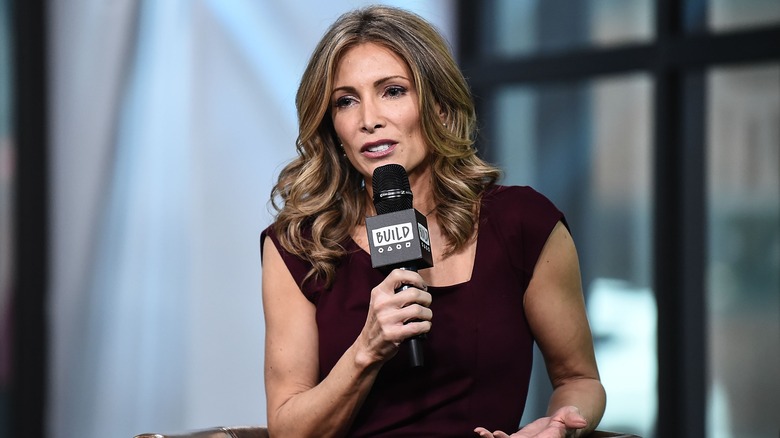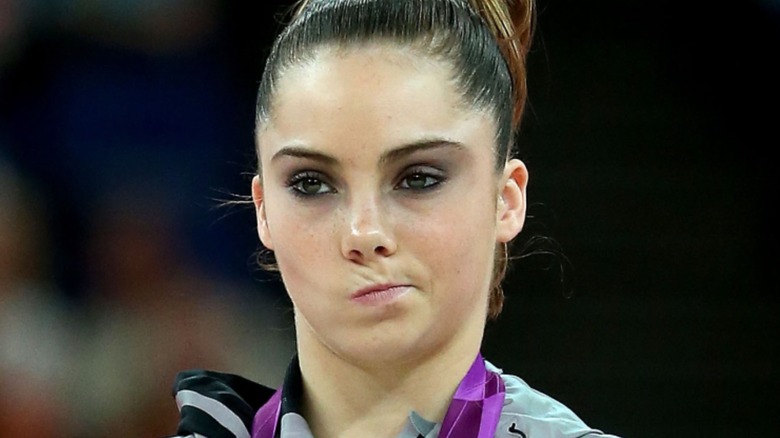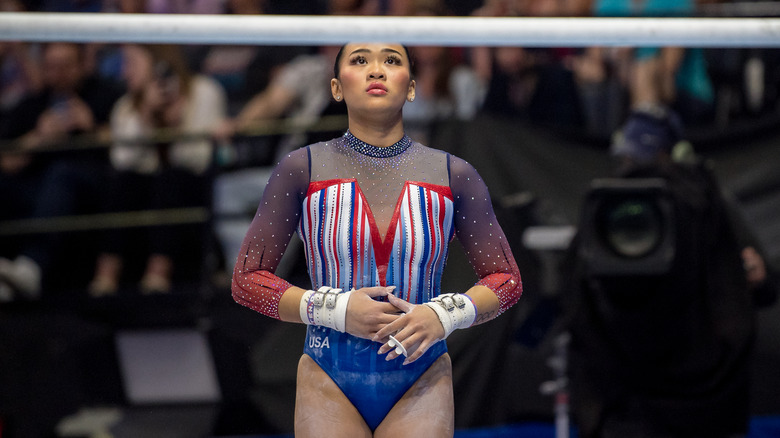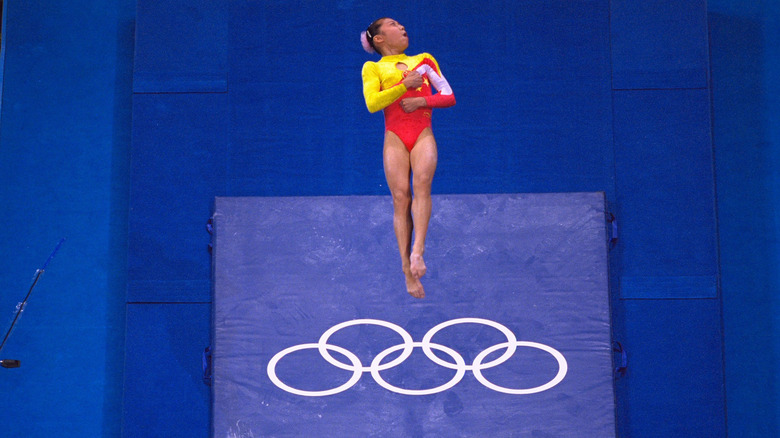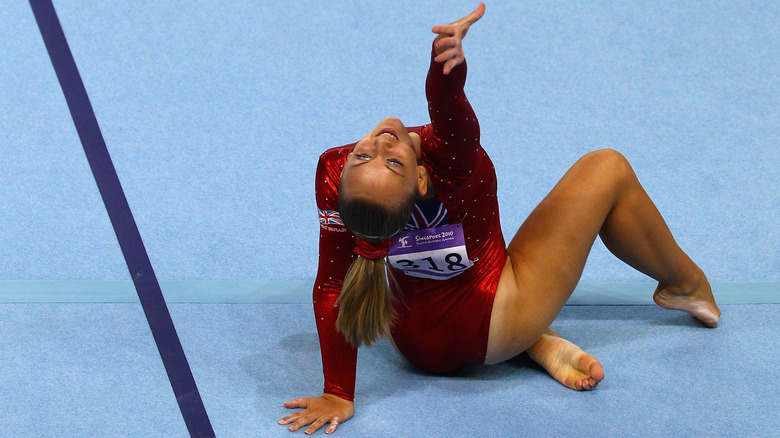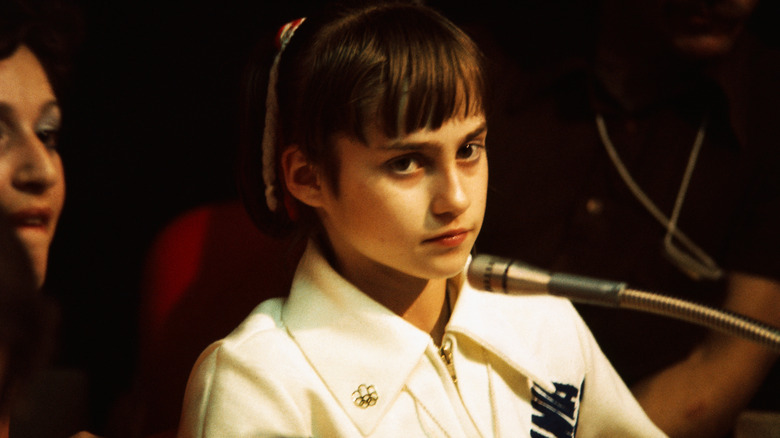The Tragic Real-Life Stories Of Olympic Gymnasts
The following article mentions sexual abuse.
Becoming an Olympic athlete is no walk in the park. It takes hours and hours of rigorous training, dedication like no other, and the willingness to push through pain to become one of the best in an Olympic sport. While all sports are demanding in their own way, gymnasts take things to a whole new level. Not only are Olympic gymnasts expected to follow strict rules and stay in peak physical condition, but they have to have the confidence and steely mindset to perform gravity-defying stunts in front of large crowds. Mistakes can prove disastrous, not just for their scores, but for their lives. Keeping a clear head is often half the battle, but some of the most famous Olympic gymnasts in the world are battling some truly terrible personal demons.
These athletes may look like superheroes, but beneath the rhinestones and perfectly coiffed hair, some of them have struggled to keep it together, both before and after they compete. In fact, the following stories you're about to read show a totally different side to the sport that most onlookers don't consider.
From terrible abuse at the hands of one of the sport's most infamous criminals to returned medals, untimely deaths, and life-changing accidents, these are the tragic real-life stories of Olympic gymnasts.
Aly Raisman was abused by the team doctor
Larry Nassar was hired in 1986 as a member of the USA Gymnastics medical team, and in the '90s, he became the team's national medical coordinator. During his time with USA Gymnastics, he abused hundreds of team members. His misconduct would remain unchecked for decades. A complaint made against him in 2014 by Amanda Thomashow was dismissed, and it wasn't until August 2016 that he was finally removed from his position. Unfortunately, by that point, the damage Nassar caused was catastrophic. Several of his victims were high-profile Olympic gymnasts, including Aly Raisman.
Raisman got her day in court in 2018 when she testified as part of Nassar's trial. Raisman revealed that Nassar had abused her for years with inappropriate touching disguised as "therapeutic treatments." Taking to the stand, the gold medallist addressed her former team doctor directly in a 13-minute statement. "Realizing that you are a survivor of sexual abuse is really hard to put into words," she said (via Time). "I cannot adequately capture the level of disgust I feel when I think about how this happened."
Raisman went on to call out the other people that she felt failed her and her fellow athletes in the honest, scathing speech. The impassioned testimony likely helped to bring about Nassar's final sentencing. The disgraced medical professional was given 40 to 175 years in prison for his crimes. Though justice was eventually served, Raisman and her cohorts won't forget.
If you or anyone you know has been a victim of sexual assault, help is available. Visit the Rape, Abuse & Incest National Network website or contact RAINN's National Helpline at 1-800-656-HOPE (4673).
Simone Biles' aunt died two days before the Olympics
Simone Biles' tragic true story shows just how much she's been through to get where she is today. As a youngster, Simone was entered into foster care alongside her siblings when her biological mother struggled with drug and alcohol abuse. Things got so bad at home, Simone told CNN, that they were treated worse than the family pet. "I just remember, like, us as kids being so hungry, and then I just remember this cat that would get fed and not like, quite us," she said. After a few years in the system, Simone was adopted by her grandparents, Ronald and Nellie Biles, who helped her grow her love for gymnastics.
Sadly, shortly before Simone won a bronze medal on the balance beam in 2020, her family suffered a tragedy. "Two days ago, my aunt unexpectedly passed, and that was something I wasn't expecting to happen at the Olympic Games either," she told reporters, according to CNN. Simone went on to implore people to be mindful of what they say about athletes online. "You have no idea of what these athletes are going through as well as (in) their sports," she said.
The Olympian's family life made headlines again in 2021 when her brother, Tavin Biles, was up in court for a triple homicide that took place in 2018. The court ruled there was insufficient evidence, and the gold medallist's brother was acquitted.
Shannon Miller was diagnosed with a rare cancer
We are so used to seeing Olympic gymnasts fly through the air and do things the average person couldn't that it's easy to think of them as infallible. Of course, they are just like us, susceptible to illnesses that don't discriminate. In the early '90s, Shannon Miller was a formidable presence in the sport, scooping five gold medals at the 1993-94 Worlds and gaining two gold medals, two silver, and three bronze medals over the course of her Olympic career. When she left competitive gymnasts behind, she went on to study law at Boston College but ended up creating her own lifestyle brand, Shannon Miller Lifestyle.
It hasn't all been sunshine and roses for Miller, though. In 2010, Miller discovered there was a tumor the size of a baseball on one of her ovaries during a routine checkup. Shortly after, she was diagnosed with germ-cell ovarian cancer, a rare form of the disease. Talking to ABC affiliate KSAT 12, Miller detailed how her background in sports helped her to remain focused on her recovery. "I think sports teaches you so many great life lessons, things like goal setting and teamwork, positive mindset, resiliency, and I think those were the things that I relied on, I kind of tapped into and utilized during my cancer journey," she explained.
The road to wellness wasn't easy, but chemotherapy worked for Miller, who went on to become cancer-free.
McKyla Maroney's heartbreak was turned into a meme
Former U.S. Olympic gymnast McKayla Maroney competed in the 2012 Summer Games, nabbing the team all-round gold medal and scooping the silver for the horse vault. However, despite what was arguably a successful year (especially for an Olympic debut), the "not impressed" meme all but stole the show.
After being presented with her silver medal, Maroney pulled a face that seemed to show her disappointment and annoyance at not placing first. The moment was fleeting, but it was enough to go viral. "Like, if you watch the video, it's two seconds," she said to Inside Gymnastics in 2014. "And I remember thinking, did I just make a face? Because it's natural. I do it all the time." Maroney had no idea that she was made into a viral sensation until she went back to the Athlete's Village that night. The meme just added insult to injury, as Maroney was the favorite to win gold, but she fell during her routine. She told the outlet that she didn't sleep for five nights after.
In a 2016 chat with Harper's Bazaar, the Olympian opened up some more about how tough that meme-worthy moment was. "I had never fallen on a vault like that in my life, especially competing on a huge stage like that, and to be honest, I was really, really embarrassed," she said. "And I was sad that I couldn't have won the gold medal for my country, and I did that face for two seconds."
Sunisa Lee's father suffered a terrible injury
Sunisa Lee went to the Olympics for the first time in 2021 when she was just 18 years old. She took home multiple medals, including the gold. "I just feel like I could have never been here ever. It doesn't even feel like real life," she told reporters at the time, according to The Guardian. Even though she was just a teenager, Sunisa had already faced her fair share of troubled moments. Two years prior, when she was getting ready to compete in the 2019 US National Championships, Sunisa's father, John Lee, suffered an accident that would change his life forever.
He was trimming a tree when he fell just days before his daughter's big competition, causing a spinal injury that left him paralyzed from the waist down. While that devastating turn of events impacted the Lee family, it's not the only thing that Sunisa has had to overcome in recent years.
In 2024, Sunisa revealed that she was diagnosed with an incurable kidney disease the previous year. In an Instagram post, Sunisa explained the life-changing illness wouldn't derail her Olympic Games plans for the year but that she hoped others would look after their own health after hearing her story. "I know firsthand that kidney disease can happen at any age, and sometimes the cause of your disease isn't clear-cut," she wrote.
The devastating deaths of the Dutch gymnasts murdered in the Holocaust
In 1928, it was the Dutch Olympic gymnastics that made a splash in the sport. The team competed on home turf in Amsterdam, and five of the athletes were Jewish: Helena "Lea" Nordheim, Anna "Ans" Polak, Estella "Stella" Agsteribbe, Judikje "Juds" Simons, and Elka de Levie. Their coach Gerrit Kleerekoper was also a Jew, and thanks to their incredible efforts scooped the gold medal. The press raved about their performance, writing (via Yad Vashem), "[T]he cheers rose when HRH Prince Hendrik stepped forward and shook hands with each of the participants ...and then they, our ladies, to whom we owe the first victory, disappeared under the grandstand to their dressing rooms."
After the Germans invaded the Netherlands in 1940, four of the women from the gymnastics team, now with children of their own, were sent to labor camps during the Holocaust. Kleerekoper was also sent to a camp with his wife and daughter. De Levie was the only one to avoid the same fate as her teammates, who were all murdered along with their families at various camps during the war. This is one of the many stark and horrific atrocities committed by Adolf Hitler and the Nazi party.
Dong Fangxiao was forced to return an Olympic medal
There was a time when the age limit for competing in the Olympics was just 14 years old, but in the '80s, it was bumped up to 15. The reasoning made sense; these young athletes were putting themselves at risk of injury while they were still growing, which could have serious complications. Most adhered to the rules, but China eventually got caught out — though not until ten years after Dong Fangxiao won the bronze medal at the 2000 Sydney Olympics. It wasn't until 2008 that questions were raised regarding her age and whether she was actually 14 years old at the time of the competition. However, China provided investigators with ID cards and other evidence that indicated all of the gymnasts were of the required age.
The scandal would have perhaps faded away if it wasn't for Fangxiao's own mistake when she registered as a technical official for the Beijing Olympics, where she listed her date of birth as January 20, 1986. This date made it clear she would've been 14 at the time she won bronze, and as a result, her medal was taken away from her by officials. China's bronze team medal was also decided, dealing a devastating blow to the athletes who were of age at the time. In 2010, it was reported that Fangxiao had moved to New Zealand with her husband to start a new life under the radar.
Jessica Hogg's mother died of a brain tumor
Elite gymnast Jessica Hogg's story is up there with the most tragic things you never knew about Olympic athletes. Hogg, a talent from Wales, competed in the Singapore Youth Olympics in 2010. She never made it to the adult arm of the competition, but she was still one of Britain's most promising gymnasts — though you could say that it was in her DNA. Hogg's mother, Karen, was also an international gymnast, but she tragically died of a brain tumor when she was just 29 years old. At the time of her mother's death, Hogg was just 18 months old.
With no relationship to her father, Hogg was adopted by her mother's parents, Sid and Pamela Downing. In yet another devastating blow dealt to the 15-year-old talent back in 2011, Pamela died suddenly. Rather than take a step back from the sport, Hogg reportedly took just two days off before throwing herself back into her training regime, but despite her best efforts to make it into the 2012 GB Olympics team, Hogg wasn't selected.
Since then, Hogg has fallen off the map, leaving us with just memories about what could have been if she was given the chance to realize her full potential.
Nadia Comaneci lived a restricted life
At just 14 years old, Nadia Comăneci became the first gymnast to receive a perfect score at the Olympics. Comăneci not only racked up a total of seven 10s at the 1976 Summer Games, but took home five medals — three of which were gold. She'd spent the bulk of her childhood training for this moment with the infamous coach Béla Károyli. A lot has been said about Károyli's training methods, but Comăneci has mostly steered clear of the allegations. "Everybody's complaining but me," she said in The Guardian in 2004. "People write, 'The Devastated Life of Nadia Comaneci,' but life is tough for everybody."
In 1989, Comăneci defected from her home country of Romania to the United States after the political climate changed. She was paid just $1,000 for an 11-city American "Nadia Tour" that the Romanian government organized. When she returned home, she was constantly being watched. "I was no longer allowed to travel outside Romania," she told The Guardian. "Whenever the Gymnastics Federation put me on a list to travel for some kind of exhibition tour, the list came back with my name crossed out."
However, her defection to America didn't immediately put her into Uncle Sam's good books, and rumors of an affair with a dictator's son hounded her, as did claims that she lived in luxury under Romania's regime. Comăneci told The Guardian these rumors were entirely fabricated, stating that she struggled financially throughout her life.
